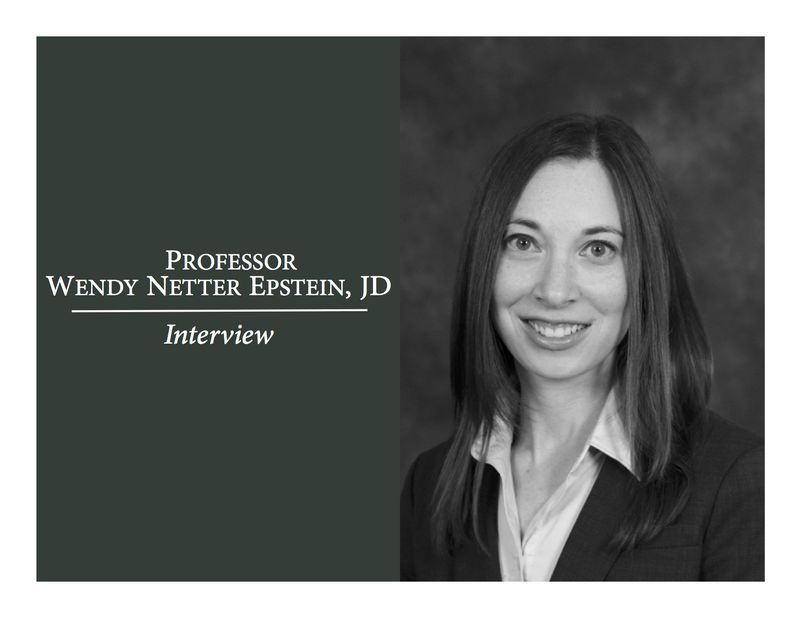 Professor Wendy Epstein
Professor Wendy Epstein shares with the
E-Pulse
her experiences as a practicing attorney, what surprised her most about the legal profession, and what DePaul law students can do to get more involved.
Before attending law school, Professor Epstein was a pre-med, political science student at the University of Illinois at Champaign-Urbana. Just before taking the MCAT, Professor Epstein realized that it was the policy and legal issues – not the actual practice of medicine – that most interested her. She went on to attend Harvard Law School, becoming involved in a variety of different extracurriculars. Professor Epstein was the President of the Harvard Law and Healthcare Society, and editor-in-chief of the Recent Developments section for the Journal of Law, Medicine, and Ethics. Beyond strictly academic activities, Professor Epstein was a member of the a cappella group, Scales of Justice, and took part in the Harvard Law School Parody, a humorous theatrical production that makes fun of HLS professors and law school more generally.
After graduating cum laude from Harvard Law in 2003, Professor Epstein clerked for the Honorable Michael Daly Hawkins on the Ninth Circuit Court of Appeals. She went on to become partner at Kirkland & Ellis, LLP, where she practiced commercial litigation with a focus in healthcare. She represented high-profile companies such as Blue Cross Blue Shield, Walgreens, and Medtronic. After teaching legal writing at Chicago-Kent, she joined the College of Law as an assistant professor in 2013, teaching Contracts, Sales, Health Law & Policy, and the newly minted Health Law Colloquium. Professor Epstein was drawn to DePaul for a number of reasons. For one, as a practitioner of health law, the strong institutional support for the Health Law Institute was an important factor. In addition, having practiced in Chicago for eight years, Professor Epstein knew of the strong reputation of DePaul Law graduates and had seen first-hand the success of its alumni.
Professor Epstein’s advice for DePaul students is a definite reflection of her own eclectic experiences as a law student at Harvard. She places import on students mixing fun activities for their own personal edification with strategic activities to boost a student’s experience in their field of choice (and their resume!). A leadership position in the Health Law Institute is a great way for students interested in health law to learn more about the field and to show a dedication to that area of the law to an employer. Professor Epstein also suggests getting involved in the Student Bar Association, Chicago Bar Association, or the Illinois Association of Healthcare Attorneys. These associations are great ways to network with practicing attorneys and to make connections throughout Chicago.
Beyond extracurricular activities, Professor Epstein suggests, especially for students interested in health law, a strong foundation in administrative law. In addition, business organizations, tax, and for those future litigators and medical malpractice attorneys, evidence and trial advocacy, are strong tools for a new lawyer’s toolbox. For a student interested in health law, Professor Epstein places great importance on learning what types of careers are available in the field because this will shape what type of externship or coursework a student takes.
What surprised Professor Epstein most about the legal profession was the great diversity within the profession. A student before and even during law school has an image of what a lawyer is like, most likely based on its numerous television portrayals, but the reality is very different. The vast majority of law students who become lawyers are not doing the kind of work that is on Law & Order, so the difference between perception of practice and the reality of it can be a shock. Professor Epstein was also surprised by how closely attuned lawyers have to be to business issues. Representing any business or corporation requires a strong understanding of that business, so there is a close relationship between a lawyer and the business world.
Professor Epstein continues to teach first year Contracts and will be teaching Health Law & Policy and the Health Law Colloquium this spring. We at the E-Pulse would like to thank Professor Epstein for taking the time out to meet with us and share her insights with our readers!
Sydney Mayer is a current student at DePaul University College of Law in Chicago. Ms. Mayer completed her undergraduate degree at the University of Illinois at Chicago in political science and French. She will complete her law degree and certificate in health law in 2016.